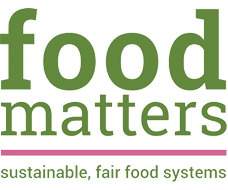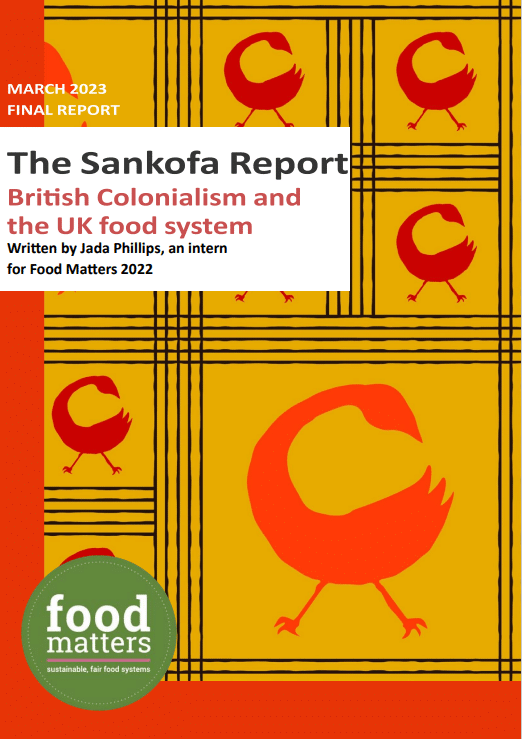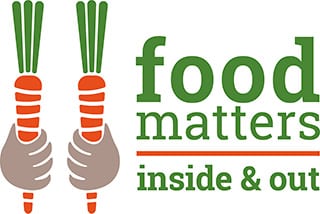Food Matters statement on active anti-racism
Food Matters is strongly committed to not simply being non-racist, but to becoming actively and visibly anti-racist in our culture, practice and our people.
This requires us to change internally – clarifying our shared values and changing our behaviour and our culture. It also means that we need to change externally – reflecting on the way we work with others, how we set our work agendas, where we take action, and how we communicate about ourselves.
We are a small organisation but that does not stop us from committing to prioritise action on racism in our own activities, the way we organise ourselves and in our attitudes to support active anti-racism in the UK food sector. We approach our commitment in a spirit of grace and positivity, embracing potential discomfort and avoiding dwelling on and becoming weighed down by guilt.
Our focus on race
While aspects of our commitment to anti-racism may overlap or be useful with respect to other ‘protected characteristics’ and marginalised groups, the focus of our commitment in this statement is race. We want to acknowledge the ways in which racism specifically is built into our food system and work to dismantle the white-supremacist legacies and realities that remain.
We understand that the ways in which people are racialised and experience racism can differ greatly, depending on other aspects of their identity and societal positionality (gender, sexuality, ability, nationality, education, socio-economic status etc.) and how visible these are. The ways in which a black man experiences racism may be very different to how a black woman does, just as how misogyny and sexism are experienced differently by white women and women of colour. It is through the lens of Intersectionality (a term coined in 1989 by Law Professor and critical race theorist Kimberlé Crenshaw) and Positionality (a term widely used in Post-Structural theory to understand our subjective social positions and ascriptions) that we approach anti-racism at Food Matters.
Principles
We believe that intentional action based on the following principles is a concrete way forward:
- Be actively anti-racist, as opposed to not racist
- Focus on and aim for systemic change
- Encourage a culture of self-reflection, self-critique, and radical honesty
- Ensure that all voices are listened to and heard and that our work and practice is evidence-based
- Signal-boost and celebrate the experience and expertise of marginalised voices
- Be proactive, as opposed to reactive, in being anti-racist
- Be willing to learn from and collaborate with organisations that are leading by example
- Acknowledge, recognise and learn lessons from Britain’s colonial history and its legacy in our food system today
Guiding questions
Working within the food sector we are guided by reflection on and response to the following questions:
- What does a healthy, sustainable and more equitable food system look like?
- What can be done to dismantle the entrenched systems of oppression within our food systems?
- How can we support food partnerships and other food organisations across the UK to lead the way in this change?
- How can our work in different food system-related programmes support our partners and organisations we engage with to be actively anti-racist in their own sustainable food work?
Action
We are taking steps to recognise, understand and act. Since 2021 Food Matters has taken a lead role in the development of the Sustainable Food Places’ REDI for Change programme. The programme is focused on organisational self-reflection and learning leading to organisational growth and strengthening viewed through the lens of Race, Equity, Diversity and Inclusion. The principles we aim to adhere to and guiding questions we aim to respond to (above) are also included in the SFP’s REDI for Change Review Tool.
As a first step, Food Matters has undertaken a participatory REDI review workshop using the REDI Review Tool to discuss and reflect on the current situation and the need for change in:
Our culture
by investing time and resources to embed anti-racist principles in Food Matters’ processes and policies.
Our practice
by improving Food Matters’ practice in our work programmes and projects following anti-racist principles.
Our people
by demonstrating a commitment to anti-racist principles through the staff, interns, consultants and volunteers working for Food Matters and through the way in which we engage with other organisations.
The first outcome and action based on this review is the development of this Food Matters statement on active anti-racism.
Our REDI Review also highlighted our need to become better informed on the impact of British colonial history on our present-day food system and on the way People of Colour relate to, engage with and are represented in the food sector. We recognise that many food partnerships and organisations, including ourselves, do not have the capacity to carry out a REDI review until we are better informed – we need to do some homework.
To address this, Food Matters’ intern, Jada Phillips, has written an extremely powerful and informative report – The Sankofa Report – providing an excellent summary of the important issues that we feel people should be aware of before undertaking work on a REDI review. This report is soon to be added to the REDI Review Tool as required reading. We thoroughly recommend reading this important piece of work.
‘Sankofa’ (a word from the Akan people of Ghana) literally means ‘retrieve’ and this is expanded in the proverb ‘Se wo were fi na wosankofa a yenkyi’ encompassing the principle: Remember the past to make positive progress in the future.






